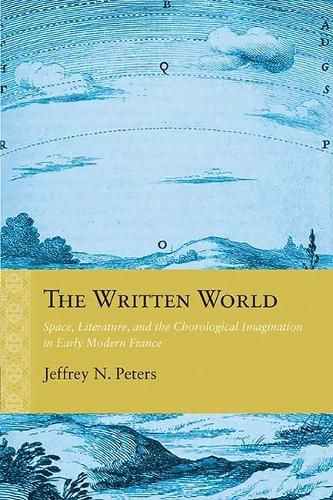Readings Newsletter
Become a Readings Member to make your shopping experience even easier.
Sign in or sign up for free!
You’re not far away from qualifying for FREE standard shipping within Australia
You’ve qualified for FREE standard shipping within Australia
The cart is loading…






In The Written World: Space, Literature, and the Chorological Imagination in Early Modern France, Jeffrey N. Peters argues that geographic space may be understood as a foundational, originating principle of literary creation. By way of an innovative reading of chora, a concept developed by Plato in the Timaeus and often construed by philosophical tradition as space, Peters shows that canonical literary works of the French seventeenth century are guided by what he calls a chorological approach to artistic invention. The chorological imagination describes the poetic as a cosmological event that gives location to - or, more accurately, in Plato’s terms, receives - the world as an object of thought.
In analyses of well-known authors such as Corneille, Moliere, Racine, and Madame de Lafayette, Peters demonstrates that the apparent absence of physical space in seventeenth-century literary depiction indicates a subtle engagement with, rather than a rejection of, evolving principles of cosmological understanding. Space is not absent in these works so much as transformed in keeping with contemporaneous developments in early modern natural philosophy. The Written World will appeal to philosophers of literature and literary theorists as well as scholars of early modern Europe and historians of science and geography.
$9.00 standard shipping within Australia
FREE standard shipping within Australia for orders over $100.00
Express & International shipping calculated at checkout
In The Written World: Space, Literature, and the Chorological Imagination in Early Modern France, Jeffrey N. Peters argues that geographic space may be understood as a foundational, originating principle of literary creation. By way of an innovative reading of chora, a concept developed by Plato in the Timaeus and often construed by philosophical tradition as space, Peters shows that canonical literary works of the French seventeenth century are guided by what he calls a chorological approach to artistic invention. The chorological imagination describes the poetic as a cosmological event that gives location to - or, more accurately, in Plato’s terms, receives - the world as an object of thought.
In analyses of well-known authors such as Corneille, Moliere, Racine, and Madame de Lafayette, Peters demonstrates that the apparent absence of physical space in seventeenth-century literary depiction indicates a subtle engagement with, rather than a rejection of, evolving principles of cosmological understanding. Space is not absent in these works so much as transformed in keeping with contemporaneous developments in early modern natural philosophy. The Written World will appeal to philosophers of literature and literary theorists as well as scholars of early modern Europe and historians of science and geography.